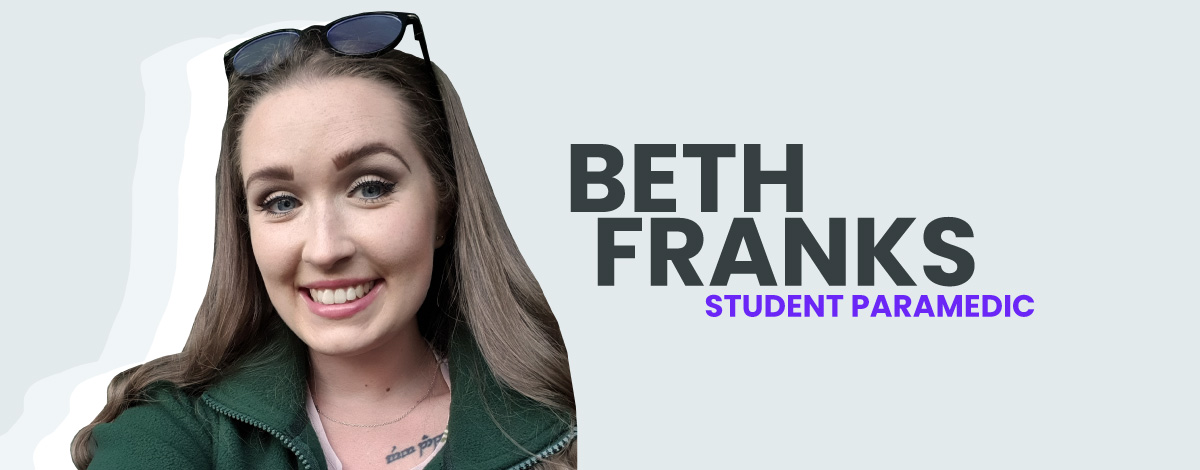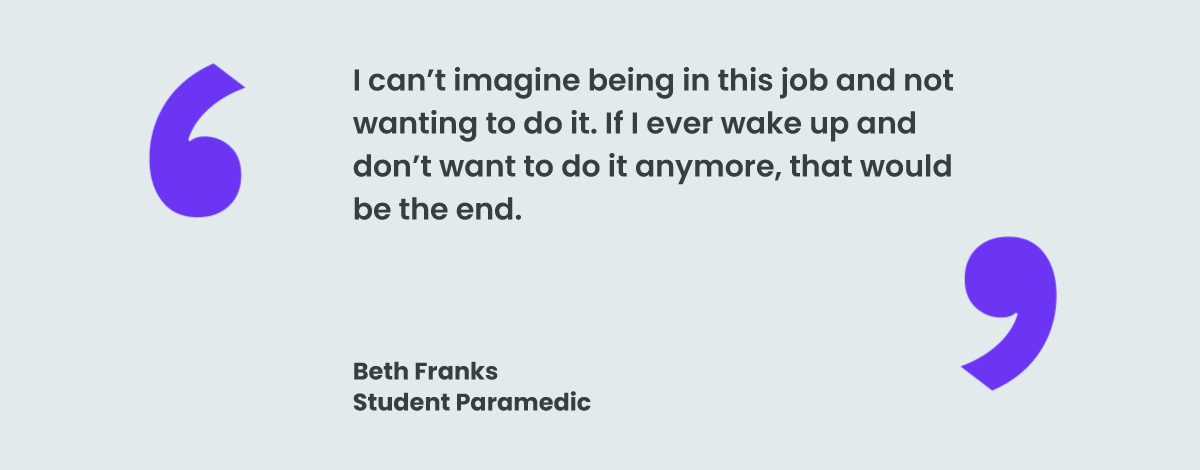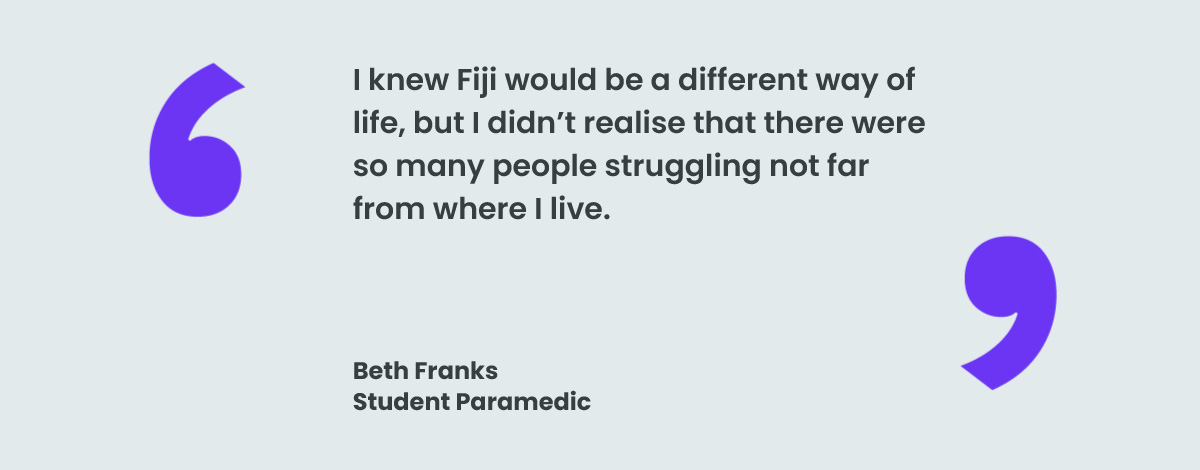Reflections with Julia: ‘I like the fact that I wake up and never know what I’m going to do that day; I don’t feel like I’m working!’
23 Jul 2021Interview
In this interview, we speak to Beth Franks, a student paramedic at the University of Brighton. Previously a beauty therapist specialising in make-up artistry who couldn’t deal with the sight of blood, Beth took a first aid course in 2017 and then helped someone with an injury to their foot a few weeks after. Coupled with a desire to work with people and feeling unfulfilled in beauty, her interest in paramedical science was triggered. Before formally taking up this career path, Beth joined St John’s Ambulance and carried out a placement in Fiji under an international volunteering programme.
We caught up with Beth to find out more about her experiences as a paramedical science student during the coronavirus pandemic.

Julia: Let’s dive in the deep end - tell us about your experience in Fiji! How did that opportunity come about and how did it impact your mindset around pursuing a career in healthcare?
Beth: “I really wanted to make sure I was doing the right thing before I started training as a paramedic. I had been working with St John’s Ambulance for a year and completed two first aid courses, then I realised I could do some volunteer work alongside travelling. I went on Involvement Volunteers International’s Health and Nutrition programme, where I stayed with a Fijian family and visited rural communities. I was doing health checks - blood pressure, weight - and giving advice to those who needed it. It was the best thing I have ever done and a real eye-opener.”
Thinking back to when you made the final decision to become a paramedic, how do your expectations of it differ from your experiences so far?
“I tried to get as much experience as possible so that it wasn’t a total shock to me, but it’s actually not as much trauma and death as people think. I didn’t realise how much social care and mental health support was involved due to the lack of funding for services in these areas. I’ve done about 520 hours of clinical work this year and can count on my hand the number of calls that you would actually expect a paramedic to deal with.
“People have been right on the brink of suicide and have called an ambulance. When we arrive, they ask to be sectioned, but we don’t have that power - all we can do is comfort them, take them to A&E, and hope they get help there.
“It’s similar with elderly people - there aren’t enough services to support them. A lot still live independently, but if they can’t afford or access certain care teams they get left alone. As well as suffering from loneliness, they might not be able to get out of their chair so can’t eat, and then they get poorly as a result. Also even if they do have care teams but have a fall, the care teams can’t pick them up, so we get called out.
"We get called out to the same people multiple times because they don’t know where else to go. And I actually do like many of these calls as the individuals are lovely and I love sitting and chatting with them. But if there were more funds and services for these groups then our job would be totally different and these patients would get much better, targeted care.
“I like the fact that I wake up and never know what I’m going to do that day; I don’t feel like I’m working! Night shifts are better than days, as it’s less manic. I do 12-hour shifts and it’s always busy - we never have times when we aren’t doing anything. Some days it’s really busy and you don’t know if you can cope. There is call after call, and loads of calls lined up in the stack, and people on short shifts sometimes need to extend their shifts.
“I can’t imagine being in this job and not wanting to do it. If I ever wake up and don’t want to do it anymore, that would be the end.”

Can you reflect briefly on your experience as a student during the pandemic? What has the impact been on your studies, and on you personally?
“I started uni in September 2019. My first placement ran from November 2019 to Christmas, then I did another placement from January 2020 until lockdown.
“When lockdown started, I got pulled off the road, with placements suspended indefinitely. I had just got into my stride, and then ended up off the road for longer than I had ever been on it.
“Nothing happened at all between March and September 2020 - we were just supposed to be on placement and have one exam. I used that time to prepare for my second year, trying to teach myself common conditions, how they present, and how you treat them, so I could feel more useful when I went back out on the road in September.
“I learnt some exciting new skills when I went back to uni in September like how to cannulate, and I was keen to practice what I had learned.
“Then, the second wave hit. It was manic; it felt like I was coming home from a warzone some days. Every hospital was full and people were queuing to get in. It was a totally different job compared to when I first started.
“I caught COVID in December but had no symptoms. When I went back in January, I was very anxious. I wasn’t sure if I wanted to do it. I knew when I started this that it was going to be mentally and physically demanding, but I never thought it was going to be dangerous. Suddenly I was putting myself and my family in a dangerous position; I had already brought COVID home to my family who are all key workers. There was all this extra pressure and it was scaring me.
“I shut myself away for a while. I was scared to go shopping and I had to stop watching the news. SECAMB released the vaccine programme in mid-January, but I couldn’t have the jab straight away as I was post-COVID.
“Once I got back out on the road in January, I was absolutely fine and got back in my stride quickly.
“From December to the end of January, 95% of calls were COVID-related. People were really struggling to breathe and I came home feeling like I had been a real paramedic. We are normally on the scene for an hour, but these visits went down to less than 30 minutes because people were so poorly and we needed to get them to the hospital quickly.”
What would you say are the most important things you have learned about yourself over your period of study?
“I appreciate things more now. I realised I actually am quite privileged, in a nice house with a nice family and a good support network. It’s opened my eyes to the way that people live.
“I knew Fiji would be a different way of life, but I didn’t realise that there were so many people struggling not far from where I live.
“I’ve also seen how quickly things can go wrong - people can be living their life and then become poorly so quickly. It’s changed my mindset. I stress a lot less now and just try to enjoy my life.”

Aside from your core texts, what are your favourite resources for expanding your professional knowledge?
“In the lockdown, I did a couple of free courses online, including one on paediatrics. I’m also still volunteering with St John’s.
“I do like books, but I’m not always in the mood to read. When I’m on funny shift patterns, I struggle to get back into a sleep routine, so I normally stick headphones in and listen to a podcast, which I love. There are so many medical podcasts - the last one I listened to was on seizures. I find if people are telling me things, I take it in a lot more than if I try to teach myself.
“I listened to some paramedics in America (EMS 20/20 podcast, and The Resus Room); it was interesting to hear how the different systems work. People tend to be much more seriously ill there because they have held off calling an ambulance because they can’t afford it.
“The College of Paramedics has a lot of resources too - you pay for membership and get access to their website, advice, and courses.”
How do you keep a log of all the different CPD-type activities you carry out?
“I keep it all in a sparkly purple folder. Then when it comes to job interviews, I have it all in one place.”
You’ve been on the Homework Help Show podcast before. In that episode, you mentioned the importance of asking questions, no matter how trivial you think it might be. Would this be the main piece of advice you would give yourself if you could go back in time to the first day of your degree course?
“Yes, only because you get thrown into the world of the ambulance service and it is very different to what you may have experienced before. There’s a lot of kit, people, and procedures, and during the first few weeks of placement, I was trying not to get in the way. I felt like a fraud when I first started, as I knew nothing.
“For example, when people were talking through things with me, like explaining a piece of kit, I wish I had just asked what it was called. I asked some questions, but not others - I thought some questions were silly, but they weren’t.
“If you have only been on the road for three or four months, you won’t know everything. You are allowed to ask questions - you are a student and that’s what you are there to do. A lot of students come straight from school to sixth form to uni at 18 or 19 years old, so in the first year, they expect you to know nothing.
“By the third year, you have to do pretty much everything. In one shift, you attend most of the calls and do observations. It’s been tough for us who were affected by the pandemic in the second year, as we had very little time on the road. But we have such great mentors - the two I have had are lovely and I really admire them.”
What are your hopes and aspirations for after you have qualified?
“At the moment, I just want to get to the end of it. I want to work on the road and just concentrate on being a paramedic.
“Eventually, I would like to do the paramedic practitioner course - a Masters in paramedic practitioner care. They’re based in GP surgeries, hospitals, and lots of other places. It’s a lot more work, but it opens different doors and it’s helpful if working shift patterns doesn’t work for you anymore.”
A huge thank you to Beth for taking the time to reflect with us on her experiences. If you enjoyed this article and found it a valuable insight into the life of a paramedic, please share it on Twitter.
Julia helps you record, reflect, and report on your CPD through our website and app.
It's an easy way for you to stay on top of your CPD. Sign up for a 14 day free today.